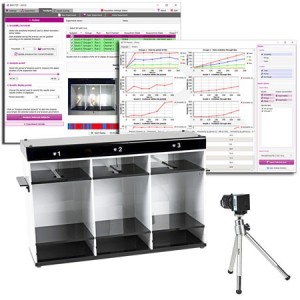Authors
M Dvorakova, A Kubik_Zahorodna, A Straiker et al
Lab
Department of Molecular Pharmacology, Institute of Molecular Genetics of the Czech Academy of Sciences, Prague 4, Czech Republic
Journal
British Journal of Pharmacology
Abstract
Background and purpose: Src homology 3-domain growth factor receptor-bound 2-like endophilin interacting protein 1 (SGIP1) interacts with cannabinoid CB1 receptors. SGIP1 is abundantly and principally expressed within the nervous system. SGIP1 and CB1 receptors co-localize in axons and presynaptic boutons. SGIP1 interferes with the internalization of activated CB1 receptors in transfected heterologous cells. Consequently, the transient association of CB1 receptors with beta-arrestin2 is enhanced and prolonged, and CB1 receptor-mediated ERK1/2 signalling is decreased. Because of these actions, SGIP1 may modulate affect, anxiety, pain processing, and other physiological processes controlled by the endocannabinoid system (ECS).
Experimental approach: Using a battery of behavioural tests, we investigated the consequences of SGIP1 deletion in tasks regulated by the ECS in SGIP1 constitutive knockout (SGIP1-/- ) mice.
Key results: In SGIP1-/- mice, sensorimotor gating, exploratory levels, and working memory are unaltered. SGIP1-/- mice have decreased anxiety-like behaviours. Fear extinction to tone is facilitated in SGIP1-/- females. Several cannabinoid tetrad behaviours are altered in the absence of SGIP1. SGIP1-/- males exhibit abnormal behaviours on delta9 -tetrahydrocannabinol withdrawal. SGIP1 deletion also reduces acute nociception, and SGIP1-/- mice are more sensitive to analgesics.
Conclusion and implications: SGIP1 was detected as a novel protein associated with CB1 receptors, and profoundly modified CB1 receptor signalling. Genetic deletion of SGIP1 particularly affected behavioural tests of mood-related assessment and the cannabinoid tetrad. SGIP1-/- mice exhibit decreased nociception and augmented responses to CB1 receptor agonists and morphine. These in vivo findings suggest that SGIP1 is a novel modulator of CB1 receptor-mediated behaviour.
BIOSEB Instruments Used
Tail Suspension Test - Wireless (BIO-TST5)
Source :

 Pain - Thermal Allodynia / Hyperalgesia
Pain - Thermal Allodynia / Hyperalgesia Pain - Spontaneous Pain - Postural Deficit
Pain - Spontaneous Pain - Postural Deficit Pain - Mechanical Allodynia / Hyperalgesia
Pain - Mechanical Allodynia / Hyperalgesia Learning/Memory - Attention - Addiction
Learning/Memory - Attention - Addiction Physiology & Respiratory Research
Physiology & Respiratory Research











![Dynamic Weight Bearing 2.0 – Postural Module [Add-on]](https://bioseb.com/733-home_default/dynamic-weight-bearing-20-add-on-postural-module.jpg)
























 Pain
Pain Central Nervous System (CNS)
Central Nervous System (CNS) Neurodegeneration
Neurodegeneration Sensory system
Sensory system Motor control
Motor control Mood Disorders
Mood Disorders Other disorders
Other disorders Muscular system
Muscular system Joints
Joints Metabolism
Metabolism Cross-disciplinary subjects
Cross-disciplinary subjects CONFERENCES & MEETINGS
CONFERENCES & MEETINGS 